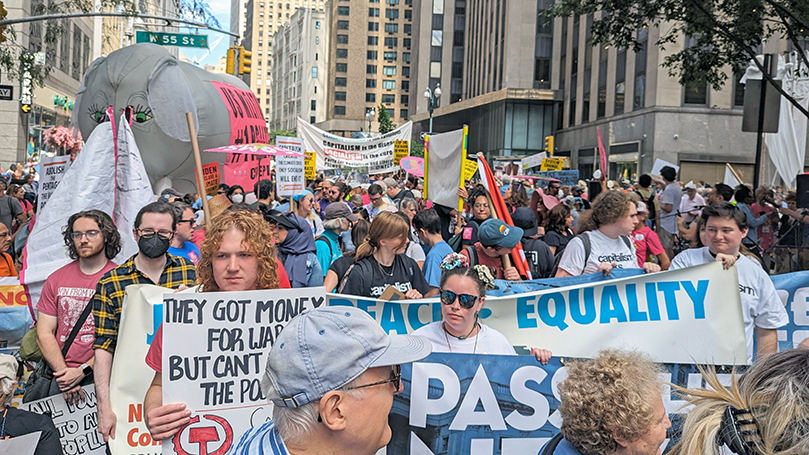
The following presentation was given at the CPUSA Peace Conference 2023, November 11-12, in New York City.
Buenas Tardes Compas (Good Afternoon comrades and friends),
I am Rosalio Munoz of the Southern California District, and a member of our National Political Action Commission. I am here to present the commission’s Toolkit of Resources For a Mass Campaign For Peace Legislation. All of you here should have in hand the toolkit and its colorful and concrete presentation of the four major peace measures before Congress to date, with their content, supporters in Congress, mass movement support, and ways to win support for them. Briefly, the four measures are:
1. H. Res. 786, which calls for “an immediate deescalation and cease-fire in Israel and occupied Palestine,” and humanitarian aid.
2. H. Res. 1134: The People over Pentagon Act, which proposes cutting the military budget by $100 billion, and for that money to be used instead for human needs.
3. H Res. 77: Embracing the goals and provisions of the Treaty on the Prohibition of Nuclear Weapons
4. H Res. 532: A resolution that supports a Third Reconstruction as proposed by the Poor People’s Campaign — a comprehensive program to fully address the issues of poverty and low wages, from the bottom up.
In his opening comprehensive keynote address, comrade Henry Lowendorf showed the importance of legislative mass campaigns to the very timely building of the peace movement at the present moment. Comrade Elisabeth Armstrong of our women’s collective, in her excellent presentation, brought out key aspects of House Resolution 532 on the Third Reconstruction and its importance to the struggle for equality and democracy. Our expectation of delegates is to look over the toolkit during the conference and workshop reports, and go into deeper detail on how to build campaigns around these legislative proposals.
Right now, I will address key principles on how to build the peace movement and carry out our legislative campaign. Here I would like to quote Karl Marx’s Inaugural Address of the International Workingmen’s Association in London October 1864:
It is the working class’ “duty to master themselves the mysteries of international politics; to watch the diplomatic [and military I would add] acts of their respective governments; to counteract them, if necessary, by all means in their power; when unable to prevent, to combine in simultaneous denunciations, and to vindicate the simple laws of morals and justice, which ought to govern the relations of private individuals, as the rules paramount of the intercourse of nations.
The fight for such a foreign policy forms part of the general struggle for the emancipation of the working class. Proletarians of all countries, unite!”
A strikingly similar formulation in this period was made in response to the French-led invasion of Mexico and installation of Maximillian as Emperor of Mexico. The indigenous President of the Mexican Republic, in its successful struggle for self-determination, stated: “Among individuals, as among nations, respect for the rights of others is peace.”
That said, I want to stress the need to grow the peace movement, especially with working-class activists and leaders. It is important to realize that there is a peace movement growing from the practice of everyday life. That is reflected in the political action and legislative measures today and in the past, and it is important to recognize and work with these realities.
The legacy of our peace movements, in practice, is in the consciousness of the generations that have lived through the last half century or more. There are memories of the masses who arose against the invasion of Vietnam, which helped win the unity of the Vietnamese people in today’s People’s Republic of Vietnam, and which built solidarity in the ’80s and ’90s with people’s liberation struggles in Central America and the movement against nuclear weapons and other arms. We remember the leadership of workers like William Winpissinger, President of the International Association of Machinists and Aerospace Workers, demanding a transfer of war manufacturing funds toward a peace dividend. At the turn of the century, we built the fight against the Bush-led ”War on Terror.” These past movements helped set the stage for the expectations and activism of the youth of today so wonderfully. The growth of the 102-member Progressive Congressional Caucus has emerged from the struggles of activists and fighters for peace, justice, and democracy, based on the sentiments, concern, and activism of working people in the belly of the beast of U.S. imperialist hegemony.
I am arguing here for the opportunity to win actual changes in policy for peace, justice, and democracy by organizing a winning, mass legislative constituency from the grassroots, from rank-and-file activists, and in government, including progressive members of Congress, especially, along with state and local government bodies and organizations. Yes, there are peace constituencies alive and ready to build today’s peace movement, including a progressive change in governmental policy and to deepen, diversify, and achieve even greater unity on issues in order to achieve gains in peace policy today. This effort will take nuts-and-bolts organizing: working person to person, block to block, precinct by precinct, and engaging in other effective activities, such as phone banks, petitions, delegations to our elected representatives, direct action, y mas (and more).
Image: CPUSA and YCL members march at the End Fossil Fuels march by People’s World (CC BY-NC 2.0 DEED)

 Join Now
Join Now